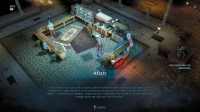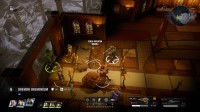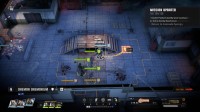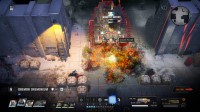Wasteland 3
Playtime: 36.8 Hours
Finished 29 July 2023.Finished just the base game in co-op, on the normal difficulty (Wastelander) and without friendly fire enabled; the game became quite the cakewalk after the first couple of areas so I almost regret not pushing it higher. My party (of 3) consisted of Child Predator Missile (SMGs/Heals/Leader), Jahan/Daemon Daemonium (Explosives/Weird Science/Rifles), and Kwon (Melee, Nerd Stuff) - until he abandoned us at the final showdown, replaced by Scotchmo. Friend's party was Shrek (Big guns), Lucia (Pistols), and Jodie (Snipers) - until she ditched, replaced by Pizepi. We got a seemingly-neutral ending; siding with Angela Deth, the Arizona Rangers all moved to Colorado (Deth stuck around) and took control of the region, the Patriarch was imprisoned, and the Machine Commune survived and became friendly to humans. Jodie and Kwon became bitter curmudgeons because they sucked and abandoned the squad so they can go fuck themselves. I don't think we have any plans for another run or to do any of the DLC; despite the deep customization and intricate systems, this doesn't seem like a game I'd like to play more than once.
Wasteland 3 is a game I didn't realize I needed; a friend and I bought it on a whim under the general pretense that it seemed like a co-op version of the Divinity: OS games with a post-apocalyptic theme to it. What I didn't realize at first is that it was made by a lot of the same minds who came up with the Fallout series, and that certainly shows. The writing strikes a fine line between a goofy, over-the-top psychopathy and the grim reality of resource scarcity, brutality and desolation that a post-government world would more realistically bring. I especially like how the environment in this game is cold and snowy, in stark contrast to the desert wastes of New Vegas and the early Fallout games or the crumbling urban sprawl of Fallout 3. I think it makes plenty of sense that the higher altitudes of Colorado would see temperatures dropping under a nuclear winter, and it does feel like a breath of fresh air differentiating the atmosphere in this game against the drab brown landscape of other games. That said, even though I really enjoyed the world, I didn't pay much attention to the story. It felt fairly generic in a sense, the central premise of the plot centering around a decision to either side with a tyrant to secure resources back home, or take them down for the people in favor of democracy and equality. There are a number of options you have throughout the game to chart the course of your specific party which does give a sense of replayability, but the gameplay towards the ending doesn't actually seem to change much outside of a few slides and some text.
As a CRPG, quite a bit of character customization and party planning is frontloaded. Before even really starting the game, decisions will probably need to be made on the general skill & stat build of each character in relation to their respective roles in the final squad. With 6 characters and a manageable number of skills, this effort is significantly lighter in WL3 compared to many other games (namely Divinity OS from my experience), but it still always pays to have each character concentrate on maximizing a couple of specific skills rather than spreading them too thin. Up to 4 of your party members can be created manually at any point in the game (from Ranger HQ), which have no backstory but also no allegiance outside of the Rangers - which turns into a potential problem later in the game. The last 2 members must come from the roster of available story companions, most of which have attachments to other in-game factions that can cause tension within the party if your actions in the story do not align with their interests. For the most part, the key distinction between these characters and your custom characters is a set appearance, unique perks/traits, and some unique world dialogue & interactions. Since you can respec any of your characters at any time (up until the point of no return), the skill builds of your companions can be changed pretty much at will. For example, Kwon starts with automatics by default, but I turned him into a melee bot to fill a gap in our team. That made it much less risky to experiment with playstyles, especially early in the game.
Also along the lines of these kinds of Western RPGs, a very significant amount of gameplay is spent outside of combat - usually running through dialogue for quests and story, exploring the map for loot, disarming traps, or solving puzzles. This game has a wide array of skills for this, and to its credit, I think a remarkably solid balance was achieved. I felt that most non-combat skills had very solid utility at various points throughout the game, particularly in dialogue or interaction checks - where your knowledge of mechanics might allow you to disable some enemies, or a high first aid ability could patch up some injured soldiers enough to get some more information out of them. This balance isn't perfect, though - in particular, lockpicking is the probably the single most valuable exploration skill in the game owing to the sheer amount of loot in every single area is blocked by it. I'd almost consider it a necessity to rush maximum lockpicking skill very early into the game, because it doesn't take very long to start seeing checks at level 8+. Nerd stuff also had a disproportionate amount of utility, being used for most computer hacking, door console opening, and even a small number of electronic safes, and explosives were absolutely vital for the heavily-trapped fights of the late game (in addition to their other utility). Paradoxically, toaster repair (which I thought was useless) was actually very reasonable, since most areas had at least one or two of them stacked with good loot. A number of the remaining skills were generally a little worse; barter kind of sucks because it's already very easy to get incredibly rich, survival is just OK for avoiding map encounters, and the leadership buffs weren't as good as the costs either (and had almost no world utility). Some additional balance or more alternative methods to get loot without investing into just a few specific skills would have been nice, but I can't complain far too much about them otherwise.
While the skill balance is overall a praiseworthy quality of the game, my opinion of the actual overworld gameplay itself was a bit more neutral. I feel like the game sets itself up to feel much bigger than it actually is; when first traveling to Downtown Colorado Springs, the impression I got was of a huge hub area, with some potential to find a number of other big areas to explore. NPCs were almost tripping over themselves to give our party some really interesting quests involving a very diverse set of completion options and outcomes, rewarding us with faction reputation and goods that we sorely needed. Even when traveling out to the world map for the first few times, every trip would instantly start with a radio call giving us some new quests to do in locations we had never seen before. This system lasted pretty well up until after the Bizarre, where the amount of side content suddenly tanked very sharply. Especially after Denver, it felt like there was little of interest to do in Colorado except take our slowly-crawling truck and drive it halfway across the map to the next major quest marker. If one of us didn't take some survival skill to skip the unnecessary random encounters on the world map, several parts of this game would have been quite the slog for sure.
The combat in this game is very fun - it feels kind of like an amped-up or sped-up version of the systems in Divinity OS, where characters can generally move further and do more in every turn, compounded with faster kill times, longer-range engagements, and less options to wall or avoid attacks completely. Compared to a game like XCOM which naturally turns into overwatch city, there are more severe limitations or difficulties setting up ambush attacks, which encourages a very aggressive playstyle to clean enemies up quickly instead of trying to funnel them into a killzone. On top of that, revives are pretty much consequence-free (outside of wasting a couple of AP) and healing items are cheap, so it's very unlikely that any group of enemies will be able to quickly take down 6 fully-geared party members within a single turn. This safety buffer of 6 people is compounded even further with the introduction of followers that can join you who don't count as a member within the party; many of these will auto-attack in a separate phase, while also drawing enemy attention towards them. With the sheer health scaling of these allies (either through the Animal Whisperer skill or just naturally through levels), it's pretty much impossible to lose a fight even if starting at a horrible disadvantage. This leads me to describe a couple of downsides of this system; first, I think the amount of depth put into the general party system came at the cost of interesting, useful skills. Unlike Divinity OS, where each character may have one or two number bars full of spells and skills they can use, each character in WL3 will typically end up with only about 2-3 active skills, plus a rechargeable talent ability. This puts a damper on the variety of each combat, since it basically boils down to a simple and repetitive procedure at some point: nuke a few enemies with Jahan, rush with my little guy and burst down a couple more, then run Kwon into the midst of the enemies to bash another dude. This kind of leads into my next issue, which is the strange fight pacing. Lots of skills & abilities feel like they were designed with long, drawn out fights in mind (for example, rocket mortar). However, because of the aggressive gameplay style (and enemy AI zerging towards you instead of holding strong positions), almost no fight in this game lasts beyond 2 turns, many ending in just one. This is a consequence of the balancing choices, on which I'll go into more detail below.
Weapon skills are very poorly balanced in my opinion. Maybe it's just the way that our party dynamic worked out, or because we were playing on a baby difficulty, but I feel like I saw signs of these problems early on, and they ran throughout the entire game. Firstly, automatic weapons are absurdly broken - costing only 4AP to fire (of 11 max for most endgame characters), with a free shot after moving, AP regeneration from a kill, and several other bonuses to accuracy or damage from perks. With an elemental attachment allowing guns to ignore armor, a single burst can almost kill many enemies (especially from the Ripper or PDW); and the range is not bad either. Perhaps somewhat fortunately (?), these are very rare and expensive to create until near the end of the game, meaning that autos are at least somewhat limited until then. These are what made the entirety of my friend's party obsolete by endgame; in an encounter with ~6 enemies, my SMG/AR users could typically sweep 3-4 of them before he even has a chance to act. And that's even without the next item: explosives. Again, explosives completely bypass armor, but can also trigger the common environmental hazards for massively increased damage. Up until midgame, they tend to kill enemies outright, but even afterwards they stay very effective as fight openers. Note that the ultimate explosive weapon (the portable nuke), also only costs 4AP - a single nuke did 85% of the final boss's health, and the cheap AP cost means that he could spam it twice in a single turn! Generally, in my experience co-oping this game, I found the above 2 to be the most valuable weapon types, with honorary shoutouts to melee & small guns. As I mentioned in the previous paragraph, this game's combat system values fast, aggressive tactics and the skills that follow along are massively powerful and indisputably better than the ones requiring a more passive approach. My friend's party with the big guns & snipers was effectively crippled in comparison to mine; while I was able to have my units maneuver AND fire on multiple enemies per turn, he was struggling to find a good space for even a single shot, with unwieldy 7AP miniguns & sniper rifles (with movement penalties!) rarely giving those characters effective actions. In the future, I'd really like to see heightened utility of heavy or defensive weapon classes in ways that never came to fruition here - as they really don't have enough benefits to offset their limited mobility.
With all the key gameplay factors discussed, it's worth finally talking about the overall co-op experience as it falls quite short of stellar. Wasteland 2 did not have co-op, so this is the first in the series that actually launched with the feature. Even about 3-4 years on, it never managed to turn into quite as smooth an experience that Divinity OS & OS2 were out of the box even though there are a couple of redeeming factors. One of those is the save system - every time the host saves, both players will receive the save - in case you want to switch hosts, or to continue a save offline for whatever reason. Synchronization is also done once one player leaves, giving a layer of redundancy just in case someone disconnects before you have a chance to save the status directly (however, a sudden disconnect results in an error and a lost save, which is still a pretty awful oversight). This game also has a competent dialogue system; skills from all present party members are accounted for in each conversation, so you don't have to stop a dialogue and restart it with another character to pass a check.
Unfortunately, overshadowing the positive traits of the co-op system is a list of aggravating downsides that we commonly experienced in our playthrough, largely relating to the UI or networking problems. The most common of these was a series of desyncing problems that were particularly noticeable on the client side. Often times, my friend would see their characters in completely different places on the overworld or in combat compared to where I saw them (as host); this led to a number of very expensive movements, or long waits to gather our party together, because one of his party members would for some reason be stuck halfway across the map for no reason (while he saw it right next to a travel point). This also manifested in a "freeze" happening frequently after combat, where he could not see his characters moving when clicking arounds, but I still could - leading to another required save/load to fix. Note that these saves & loads had a small, but not insignificant chance of freezing halfway, forcing us to restart our games to work around the infinite loading screen hang. There's a number of smaller interface & interactivity details that were constant irritations as well. This game has no way to ping spots to your partner, and in combat the other player's characters act as a wall for your own, meaning that you can't run through them. This makes fights in tight corridors or chokepoints an absolute hell, especially because the 2 players can't move their characters together (or even have a choice to go back and forth) for full-party strategies; each player effectively feels like they're on their own. Dialogue boxes in co-op also have a really long cooldown by default when selecting an option, which cannot be removed, only reduced - making the entire game effectively slower and more irritating.
There are a number of more general issues in my time playing this game as well, not necessarily limited to just co-op problems. The most prominent in my mind was some strange lag issues in several areas (mostly around Denver, if I recall) that would randomly cause my FPS to tank all the way to 1-2 for seemingly no reason. It seemed like it was related to some kind of menu or particle effect; sometimes, it would clear after about 10-15 seconds, while other times it would force me to close my game so I didn't have to play a Powerpoint presentation. I never found the actual cause. Additionally, Kwon had several moments where he seemingly randomly decides to leave the party, claiming you attacked an ally - this is most prominent in the Ranger HQ Scar Collector fight, which we had to restart about 5 times because he couldn't keep that shit to himself. Lastly, there are a number of still-unpatched common issues with the combat as a whole: lots of skills do not proc correctly for some reason, or otherwise sometimes malfunction for seemingly no reason. This happened a lot for stormer (free SMG/AR attack after moving 5 spaces) and rally (+2 AP for all allies in range, sometimes randomly resisted by teammates). In general, statuses don't seem to work very well, and there have been a number of horrible accuracy bugs during a few sessions as well. It was exceptionally common for one of us to miss several 95% hits in a row, sometimes even in one fight (record is probably ~5) - this happened FAR above the actual expected rate, and from looking online this is not an isolated incident.
At the end of the day, I overall loved this game, but would never seek to play it again, I think. This is the kind of game which feels very wide & expansive with huge opportunities for different builds on a first playthrough, but quickly reduces to optimized skillsets and quest order on subsequent playthroughs where we would inevitably target some specific ending. The excitement of digging up a random hole or picking a chest to find a monumentally better weapon is gone at this point, because we know what all of the upgrades are now, and our 6 characters have pretty much used every weapon type between them. Also as mentioned before, the lack of true variety in combat (via skills) also discourages me from trying out new and questionable combinations because we already know the kinds of enemies that are common and uncommon well enough to make those judgements and adjustments far in advance. I think I'll remember this game as an ambitious, well-crafted and fast-paced CRPGs with some unfortunate shortcomings and a lot of rough edges.









